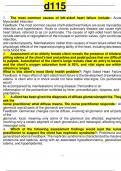College aantekeningen
Lecture notes Neuropsychology of Ageing and Dementia (PSMIN20)
These are comprehensive notes from all lectures for the course "Neuropsychology of Ageing and Dementia (PSMIN20)." Numerous images have been added, and I took extensive notes based on what the lecturer explained.
[Meer zien]





